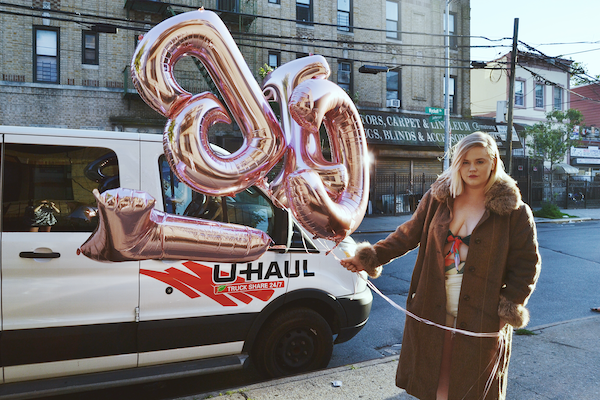Tenderheart Bitches is the musical project of Brooklyn-based new music composer and punk rock artist JL Marlor. Self-described as a “doomsday device with pitch,” JL has made a name for herself in the New York experimental classical scene since moving to the city after graduating from Smith College in 2016.
On June 30, Tenderheart Bitches released their debut single “Blood Orange.” We caught up with JL to hear more about their work.
How long have you been creating your art?
I’ve been a professional contemporary classical composer for about five years now. I started composing art songs and opera when I was in late high school and wrote my first opera when I graduated college. It wasn’t until moving to New York City that I even considered writing music that wasn’t classical. In 2016, I joined the songwriting team for a riot-grrrl punk rock adaptation of the Antigone myth, and one of my fellow songwriters really encouraged me to write my own music. Once I did that, it was like the floodgates opened, and I really couldn’t stop.
Where are you from? How does that influence your art?
I am from the Northshore of Boston, and grew up right across the bridge from Salem, MA. Growing up, I always sang in church choirs and did musical theater. I even took guitar lessons, but I never really felt that being a professional musician was possible— there were just no concrete musicians that I could look up to. Although my background doesn’t really influence my music, I do find that growing up in such a witchy town has contributed to some of my sonic texture. I love ominous textures, and I love using symbolism in my music and creative concepts.
What are you currently working on or recently finished?
I just finished mixing and mastering my debut EP, High Kicks, which is coming out August 27th. It’s a rip-roarer of emotions and crunchy guitars, during a period of intense instability and change in my life. I was in a long-term relationship with a man, realizing I was deeply queer because I was quickly falling in love with a very close friend. I left my partner, came out, and was immediately and chaotically ghosted by my friend. The only thing I could do was write music about it.
What is your inspiration? And why?
I’m mostly inspired by poetry and text. I find that I always start my songwriting process with lyrics, and I don’t start until I have one really strong lyric. Something that makes you do a double take.
Why is music important to the queer community?
Music is a way that we can connect and share as people. When I was coming out, I held so close to songs that made me feel validated in my queerness. It made me feel like I was not alone. Like, if they could figure out this beast in my gut, then I could too.
What do you hope to achieve as an artist?
I have kind of chaotic and big dreams. My mentor recently asked me “Are you going to stick with this classical composition thing, or are you going to go off and become a rock star?” My response “Why not both?” A huge dream of mine would be to orchestrate for a big name artist, or write an indie rock opera monster. I think these worlds of contemporary classical and indie rock, even punk rock, fit so beautifully together.
Who are your top 3 major influences?
St Vincent is my biggest influence by far, even if we don’t really sound similar. I also am very inspired by Lucy Dacus, and the choral and orchestral work of the contemporary classical composer Julia Wolfe.
How can we all support your work, talent, and gift?
Sharing my music if it compels you is the most tangible way to support artists like me. I only have a couple hundred followers, but in the short time that my music has been out in the world, I’ve been receiving messages from strangers about how my music has impacted them and I just think…like, what if we were able to reach more people — especially more young queer people? What kind of impact could we have?


